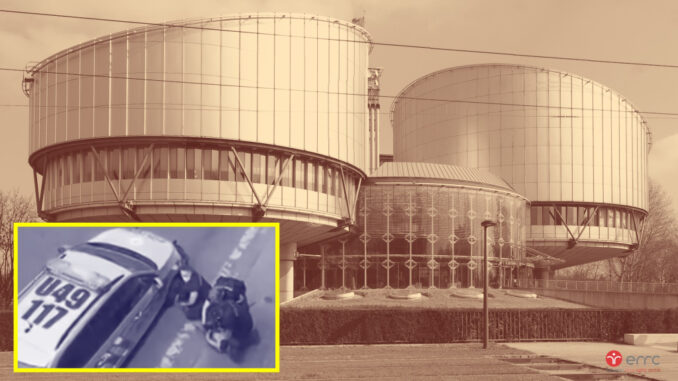
The European Court of Human Rights has communicated the case against the Czech Republic for the death of Romani man Stanislav Tomáš while being forcibly restrained by police officers in Teplice in 2021.
Lawyers from the European Roma Rights Centre (ERRC) and the Forum for Human Rights (FORUM) filed the case before the European Court on behalf of the deceased’s sister. The application concerns both the police intervention, where officers forcibly restrained Stanislav Tomáš by kneeling on his neck and legs for several minutes, and the ensuing criminal investigation into the circumstances of his death.
In the complaint before the Court, Ms. Tomáš also states that the state failed to conduct a proper investigation into the role her brother’s ethnicity played in the violence inflicted by the police officers. Further, that under Article 13 of the Convention, she did not have at her disposal any effective domestic remedy against the closing of the file by the General Inspectorate of Security Forces.
Maroš Matiaško, the family’s attorney and human rights lawyer, explains that ”the communication of the complaint is the last stage before the European Court of Human Rights makes its decision. Now we have to wait for the Czech government’s position, to which we can respond ourselves. After that, there is only the final decision. We believe that by the end of 2025 a definitive ruling could be made.”
In its communication published on 30 January 2024, the Court wants to know if the victim’s right to life was violated, if his death resulted from the use of more than absolutely necessary force, and if Stanislav Tomáš was subjected to treatment contrary to Article 3 at the hands of the police.
With regards to the subsequent inquiry, the Court wants to know if there has been any independent and thorough investigation by the General Inspectorate of Security Forces, given that that authority relied on information and evidence provided by the police; and if the medical expert opinions ordered by the police can be considered as impartial and independent.
Furthermore, the Court has asked whether the domestic authorities have before them information that was sufficient to bring into play their additional duty: “to take all reasonable steps to unmask any racist motive and to establish whether or not ethnic hatred or prejudice towards the Roma minority may have played a role in the alleged ill-treatment of the applicant’s brother … And if so, did they take such steps?”
“Having exhausted all domestic remedies, the hope is that justice will be delivered in the Strasbourg court for Stanislav Tomáš, said ERRC President Đorđe Jovanović, “This case demonstrates not just the long-standing problem of police violence against Roma, but the absence of anything resembling independent, impartial, or credible investigation procedures.”
Miroslav Brož, the family’s social worker from Konexe Association, commented: ”the case concerning the tragic death of Stanislav Tomáš has finally got to this point before the court, mainly due to the family’s legal representative and the work he and his team have done on the case. I would also like to highlight the courage of the deceased’s sister, who never gave up in her efforts to find the truth and achieve justice.” Since the beginning of the case, the Konexe NGO has acted as a liaison between the family and their lawyer, providing them with the support of its social worker.
Case background:
The incident in question aroused international outcry and protests when footage of the death of Stanislav Tomáš was shared on social media. The image of a police officer kneeling on the neck of Stanislav was chillingly reminiscent of the killing of George Floyd in the USA in May 2020. The police ordered forensic expert opinions, which concluded that the Czech applicant’s brother’s death was due to a drug intoxication, not to the police intervention.
Further controversy erupted when Czech Prime Minister Andrej Babiš thanked the police officers for their work, stated that Stanislav Tomáš did not die due to police intervention, commented that aggressive people cannot expect to be handled with kid gloves, and stated “This is sad, but a normal, respectable person would have a hard time getting into such a situation.”
A report in 2020 by the Czech Deputy Public Defender of Rights Monika Šimůnková found that officers committed ‘three fatal errors’ during the intervention in which Stanislav Tomáš perished: First, they delayed calling an ambulance and failed to monitor his physical state during the arrest; second, they failed to ascertain in a timely fashion that Stanislav Tomáš had stopped displaying signs of life; and third, they failed to remove his handcuffs and did not begin to immediately resuscitate him when he collapsed. She also found that the subsequent investigation fell short of adequate, especially in its neglect to include testimony from the paramedic crew, which completely contradicted police assertions that Stanislav Tomáš did not collapse until he was inside the ambulance.
This press release is also available in Czech.




